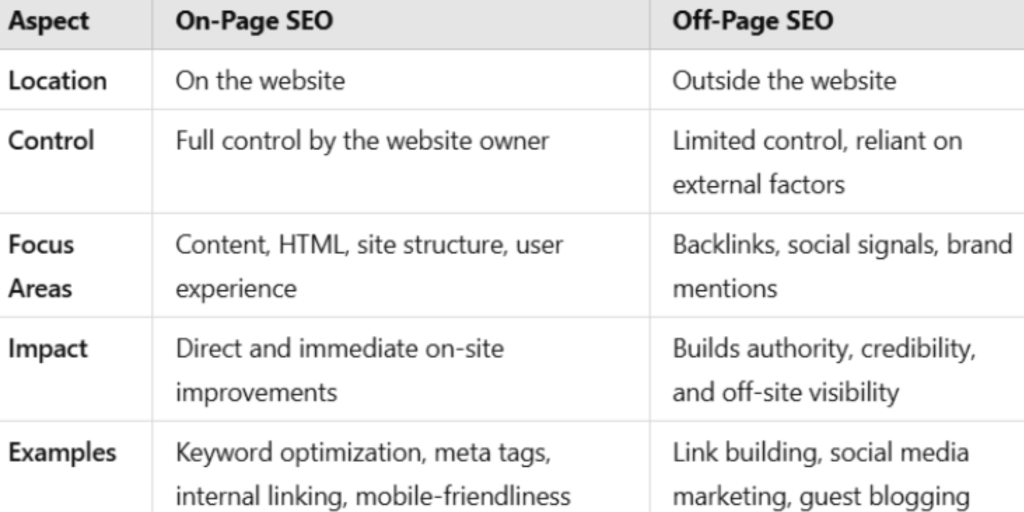Table of Contents
ToggleOn-Page SEO vs. Off-Page SEO: Understanding the Key Differences
When it comes to improving your website’s visibility and ranking on search engines, two terms often come into play: on-page SEO and off-page SEO.
Both are essential components of a robust SEO strategy, but they focus on different aspects of optimization.
Let’s break down the differences and how they work together to help your website shine.
What is On-Page SEO?
On-page SEO involves the strategies and techniques applied directly on your website to improve its search engine rankings.
It’s like giving your website an internal makeover to make it user-friendly, fast, and optimized for search engines.
Key Elements of On-Page SEO
Content Quality
- Keywords: Research and use relevant keywords that match what your audience is searching for.
- Content: Craft high-quality, engaging, and valuable content that addresses user needs.
HTML Elements
- Title Tags: Craft engaging and keyword-optimized titles for every page to attract both users and search engines.
- Meta Descriptions: Write concise descriptions that summarize page content and entice clicks.
- Headings: Organize your content with H1, H2, and H3 tags to emphasize key sections and improve readability.
URL Structure
Design clean, descriptive, and keyword-friendly URLs for better readability and ranking.
Internal Linking
Connect relevant pages within your site to enhance navigation and distribute link authority effectively.
Image Optimization
Use descriptive file names, alt tags, and captions to enhance image search visibility.
Mobile-Friendliness
Ensure your website is fully responsive, offering a smooth and seamless experience across all devices.
Page Load Speed
Optimize images, leverage caching, and minimize code to boost loading times.
User Experience (UX)
Create an intuitive, visually appealing layout with easy navigation and clear calls-to-action.
Why On-Page SEO Matters
On-page SEO is your direct line of control. You can make immediate adjustments that impact your site’s structure and content, improving user experience and increasing engagement.
What is Off-Page SEO?
Off-page SEO focuses on activities outside your website to build authority, credibility, and reputation. It’s about how others on the internet perceive and interact with your website.
Key Elements of Off-Page SEO
Backlinks
- Quality: Secure links from authoritative and relevant websites.
- Quantity: Build a natural and diverse backlink profile from various sources.
Social Signals
- Boost content visibility through shares, likes, and comments on social media platforms.
Brand Mentions
- Earn mentions of your brand across forums, blogs, and social media, even without direct links.
Guest Blogging
- Publish articles on authoritative sites to gain exposure and backlinks.
Influencer Outreach
- Collaborate with influencers to promote your content and drive traffic.
Local SEO
- Optimize for local search by managing your Google My Business profile and earning local citations
Content Marketing
- Create and distribute valuable content like infographics, videos, and blog posts to attract backlinks and social engagement.
Why Off-Page SEO Matters
Off-page SEO Focus on building your website’s reputation and authority through external optimization strategies. It’s essential for earning trust from search engines and users, which ultimately leads to higher rankings and more traffic.
On-Page SEO vs. Off-Page SEO: Key Differences

Wrapping Up
On-page SEO ensures that your website is optimized for both search engines and users by focusing on content, structure, and usability. Off-page SEO builds your website’s reputation and authority through backlinks, social signals, and content marketing.
Both strategies are vital. Think of on-page SEO as building a solid foundation and off-page SEO as spreading the word about it. Together, they create a powerful SEO strategy that drives visibility, credibility, and success.
For more tips and insights on SEO and digital marketing, visit Hello Mithun, your go-to blog for actionable advice and strategies!
Share this post: on Twitter on Facebook on LinkedIn

